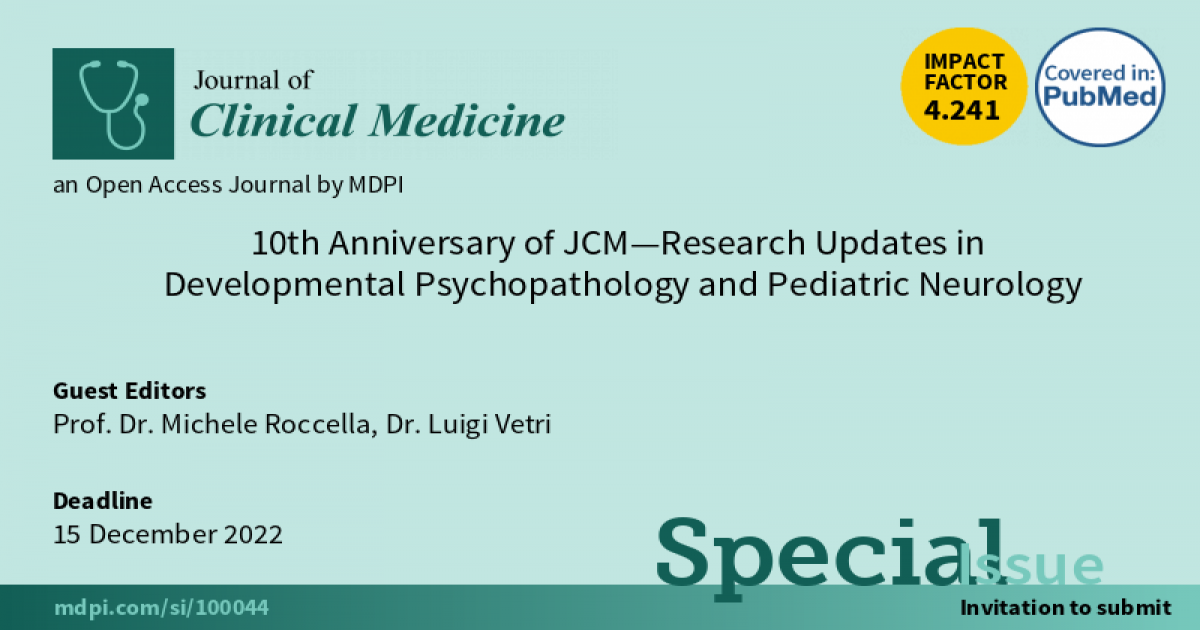10th Anniversary of JCM—Research Updates in Developmental Psychopathology and Pediatric Neurology
A special issue of Journal of Clinical Medicine (ISSN 2077-0383). This special issue belongs to the section "Mental Health".
Deadline for manuscript submissions: closed (30 June 2023) | Viewed by 32126

Special Issue Editors
Interests: neurodevelopmental disorders; encephalopathies; epilepsies; neuromuscular diseases; sleep disorders; rare genetic syndromes; neuropsychological disorders
Special Issues, Collections and Topics in MDPI journals
Interests: neurodevelopmental disorders; epilepsy; autism; intellectual disability; primary headache; rare genetic syndromes; neuropsychological disorders; psychiatric disorders in children and adolescents
Special Issues, Collections and Topics in MDPI journals
Special Issue Information
Dear Colleagues,
An accurate identification of children’s pathogenic neuropsychological developmental trajectories or, on the contrary, of children's typical developmental trajectories is one of the main objectives of developmental psychopathology. This branch of medical sciences integrates various disciplines and areas of study, including embryology, neuroscience, ethology, clinical psychology, and neuropsychiatry.
Psychopathological disorders usually begin early during an individual's neuropsychological development and generally involve some degree of impairment in a child's personal, social, and academic functioning.
The meticulous clinical and therapeutic characterization is crucial for an effective treatment of the main childhood psychopathological conditions such as anxiety disorders, mood disorders, attention deficit hyperactivity disorder, autism spectrum disorder, sleep disorders, specific learning disorders, behavioral disorders, intellectual disabilities, eating disorders, tic disorders, and communication disorders.
This process should also ensure the early identification of both genetic and environmental psychopathological risk and resilience factors and the analysis of frequent medical and neurological comorbidities that often complicate the clinical picture. In fact, in pediatric neurological diseases such as epilepsy or chronic headaches, psychopathological consequences are common and are sometimes more disabling than the disease itself.
This Special Issue will collect the experiences of clinical psychologists, psychiatrists, neurologists, and pediatricians from different areas and countries in order to acquire new perspectives in the diagnosis and treatment of childhood neurodevelopmental disorders.
Prof. Dr. Michele Roccella
Dr. Luigi Vetri
Guest Editors
Manuscript Submission Information
Manuscripts should be submitted online at www.mdpi.com by registering and logging in to this website. Once you are registered, click here to go to the submission form. Manuscripts can be submitted until the deadline. All submissions that pass pre-check are peer-reviewed. Accepted papers will be published continuously in the journal (as soon as accepted) and will be listed together on the special issue website. Research articles, review articles as well as short communications are invited. For planned papers, a title and short abstract (about 100 words) can be sent to the Editorial Office for announcement on this website.
Submitted manuscripts should not have been published previously, nor be under consideration for publication elsewhere (except conference proceedings papers). All manuscripts are thoroughly refereed through a single-blind peer-review process. A guide for authors and other relevant information for submission of manuscripts is available on the Instructions for Authors page. Journal of Clinical Medicine is an international peer-reviewed open access semimonthly journal published by MDPI.
Please visit the Instructions for Authors page before submitting a manuscript. The Article Processing Charge (APC) for publication in this open access journal is 2600 CHF (Swiss Francs). Submitted papers should be well formatted and use good English. Authors may use MDPI's English editing service prior to publication or during author revisions.
Keywords
- intellectual disability
- attention deficit hyperactivity disorder
- autism spectrum disorder
- anxiety
- mood
- epilepsy
- sleep
- emotions
- learning disability
- headache
Benefits of Publishing in a Special Issue
- Ease of navigation: Grouping papers by topic helps scholars navigate broad scope journals more efficiently.
- Greater discoverability: Special Issues support the reach and impact of scientific research. Articles in Special Issues are more discoverable and cited more frequently.
- Expansion of research network: Special Issues facilitate connections among authors, fostering scientific collaborations.
- External promotion: Articles in Special Issues are often promoted through the journal's social media, increasing their visibility.
- e-Book format: Special Issues with more than 10 articles can be published as dedicated e-books, ensuring wide and rapid dissemination.
Further information on MDPI's Special Issue polices can be found here.







